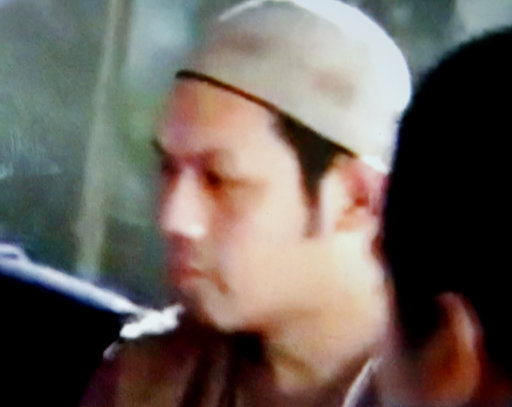Philippines: IS funded siege through Malaysian militant

This image taken from an undated video shown to The Associated Press by the Philippine military shows Malaysian militant Mahmud bin Ahmad, who helped lead and finance the siege in southern Marawi city. Philippine Armed Forces Chief Gen. Eduardo Ano told The Associated Press on Friday, June 23, 2017, that Mahmud bin Ahmad died June 7, 2017, from wounds sustained in fighting with government troops in Marawi last month. (Philippine military via AP)
MARAWI, Philippines — The Islamic State group helped fund the monthlong siege of a southern Philippine city through a Malaysian militant who was reportedly killed by troops, the Philippine military chief said Friday.
Gen. Eduardo Ano told The Associated Press that Malaysian Mahmud bin Ahmad reportedly channeled more than $600,000 from the IS group to acquire firearms, food and other supplies for the attack in Marawi. Money believed to be from illegal drugs also funded the uprising, he said.
Mahmud was wounded in the fighting last month and reportedly died on June 7. A local militant leader, Omarkhayam Maute, also is believed to have been killed in the early days of intense fighting and troops were looking for their remains to validate the intelligence the military had received.
Troops are seeking the help of villagers to pinpoint the exact spot where Mahmud was reportedly buried, Ano said. Malaysian security officials have also received information of Mahmud’s killing in Marawi and were trying to confirm it.
Two other rebel leaders, top Filipino militant suspect Isnilon Hapilon and Maute’s brother, Abdullah, were still fighting in Marawi, he said.
A former Malaysian university professor who became radizalized and received training in Afghanistan, Mahmud appeared in a video showing militant leaders planning the Marawi siege in a hideout, a sign of his key role in the uprising. The AP obtained a copy of the video, which was seized by troops May 23.
A month ago, about 500 local militants, along with several foreign fighters, stormed into Marawi, a bastion of Islamic faith in the south of the predominantly Roman Catholic nation. Troops since then have killed about 280 gunmen, recovered nearly 300 assault firearms and regained control of 85 buildings. Many of the high rises were used as sniper posts to slow down the advance of government forces, the military said.
At least 69 soldiers and police and 26 civilians have died in the fighting. Only four Marawi villages remain in the hands of the militants, out of the 19 of 96 villages across the lakeside city of 200,000 people that the black flag-waving militants had occupied.
“They are constricted in a very small area. They’re pinned down,” Ano said. He said that three boatloads of gunmen who tried to join the militants were blasted by navy gunboats three days ago in Lake Lanao, which borders Marawi.
Ano said that the battle was taking longer because the militants were using civilians as human shields.
“We can just bomb them away or use napalm bomb to burn everything, but then, we will not be any different from them if we do that,” he said.
The audacious attack by the heavily-armed militants and their ability to hold on to large sections of a city for weeks had surprised the government and sparked fears among Southeast Asian countries that the Islamic State group was seriously moving to gain a foothold in the region.
Australian Defense Minister Marise Payne said the Philippines accepted an offer of two AP-3C Orion aircraft to provide surveillance to local troops. The U.S. military has earlier deployed a spy plane and drones over Marawi.
Powerful clans and warlords, along with insurgencies, have effectively weakened law enforcement in large areas in the country’s south, making it easier for militants to take over an area and hold it, said Sidney Jones, director of the Institute for Policy Analysis of Conflict in Jakarta, Indonesia.
“I do think that martial law doesn’t solve the problem and I think military strikes, especially airstrikes, don’t solve the problem,” Jones said. “It’s much broader problem that needs a strategic solution.”
Facing his worst crisis, President Rodrigo Duterte has declared martial law in the south to deal with the Marawi siege.
Philippine Foreign Minister Alan Peter Cayetano and his Malaysian and Indonesian counterparts met with top security officials in Manila Thursday to discuss the crisis. They agreed on a plan of action to combat terrorism and rising extremism and deal with the prospects of Asian fighters returning to their region from Syria and Iraq, where the IS group has been losing territory.